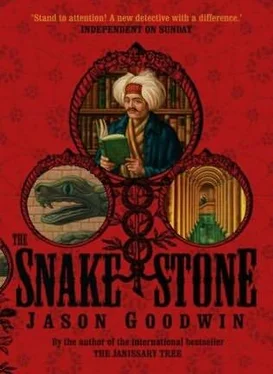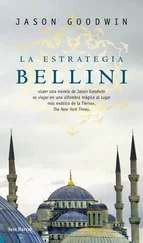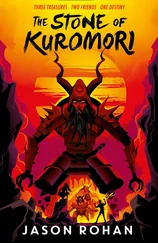Jason Goodwin - The snake stone
Здесь есть возможность читать онлайн «Jason Goodwin - The snake stone» весь текст электронной книги совершенно бесплатно (целиком полную версию без сокращений). В некоторых случаях можно слушать аудио, скачать через торрент в формате fb2 и присутствует краткое содержание. Жанр: Исторический детектив, на английском языке. Описание произведения, (предисловие) а так же отзывы посетителей доступны на портале библиотеки ЛибКат.
- Название:The snake stone
- Автор:
- Жанр:
- Год:неизвестен
- ISBN:нет данных
- Рейтинг книги:4 / 5. Голосов: 1
-
Избранное:Добавить в избранное
- Отзывы:
-
Ваша оценка:
- 80
- 1
- 2
- 3
- 4
- 5
The snake stone: краткое содержание, описание и аннотация
Предлагаем к чтению аннотацию, описание, краткое содержание или предисловие (зависит от того, что написал сам автор книги «The snake stone»). Если вы не нашли необходимую информацию о книге — напишите в комментариях, мы постараемся отыскать её.
The snake stone — читать онлайн бесплатно полную книгу (весь текст) целиком
Ниже представлен текст книги, разбитый по страницам. Система сохранения места последней прочитанной страницы, позволяет с удобством читать онлайн бесплатно книгу «The snake stone», без необходимости каждый раз заново искать на чём Вы остановились. Поставьте закладку, и сможете в любой момент перейти на страницу, на которой закончили чтение.
Интервал:
Закладка:
The Franks had dining rooms for dining in, and sitting rooms for sitting in, and drawing rooms for withdrawing into-as if their whole lives were not a series of withdrawals anyway, tiptoeing from one room and one function to the next, changing and dressing all over again, forever on the run from engagement with real life. Whereas in an Ottoman home-even here, in the harem-everyone was allowed to float on the currents of life as they sped by. People divided their lives between what was public and what was reserved for the family, between selamlik, the men’s quarters, and haremlik: in the poorest homes, they were divided only by a curtain. If you were hungry, food was brought in. If you wished to sleep, you unfolded your legs, reclined, and twitched a shawl over yourself. If you were moody, someone was sure to drop in to cheer you up; ill, and someone noticed; tired, and nobody minded if you dozed.
The valide took the book and raised an eyebrow.
“I may seem terribly old to you, Yashim, but I do hope you aren’t wondering whether I knew the author.”
Yashim giggled. The valide reached for a pair of spectacles and put them on. She glanced warningly at Yashim over the rims. “I have my vanities, quand meme,” she said.
Yet Yashim was too delighted with the novelty of seeing a woman in spectacles to consider their effect on the valide’s beauty. He knew her for a reader, of course; but the spectacles made her seem, well, magnificently wise.
She examined the brown leather cover of the little book at some length, turning it this way and that. She ran a slim finger behind the boards and opened the first page. She tilted her head.
“I do not think,” she said, “it is the sort of book which would interest us. For a start, it’s not in French. De Aedificio et antiquitae Constantinopolii,” she read slowly. The hand holding the book sank to the cushions. “Dancing. Deportment. The interminable tragedies of Monsieur Racine.” She paused. “It was a long time ago, Yashim, and we were educated-to adorn, not to be scholars. I think it’s Latin,” she added with a little shiver.
Yashim, who had already guessed as much, tried to conceal his disappointment. “I thought-perhaps-you would be familiar with it.”
“Latin, Yashim?” The valide gave a bright little laugh. “But no, you are right. I’m sorry, it is so long ago.” She ran a finger beneath an eyelid, to wipe away a tear. “How silly of me. I was thinking of my mother. A very clever woman. Not in my way, of course. She was a dreamer, idealiste. Father wanted us to be pretty. But my mother-she did try to teach us something, beyond dancing and the use of our fans. Even Latin.” She smiled sadly. “I think it was always too hot.”
She looked up almost shyly. “I have not spoken of them for many years,” she said. She removed her glasses and set them down on the carpet beside her. “The edifices and antiquities of Constantinople,” she said, handing the book back. “I’m not much help. You probably already know when it was published.”
“In Rome, in 1560.”
The valide gave Yashim a long look. “There is something going on between you and your friend Palewski, n’est-ce pas?”
“Valide?”
She tut-tutted and wagged a finger. “Tsk-tsk-tsk-tsk. Palewski is a well-educated man, and he was brought up in a Catholic country. A cold country, where it is easy to learn Latin, among other things. I think his Latin would be better than mine. Why do you not consult him? He is your friend.”
Yashim looked away. “Monsieur Palewski has put me in an awkward situation,” he said stiffly.
“I see. It was his intention to do so?”
Yashim shook his head. “No.”
The valide cocked her head to one side. “Friendship is an opportunity, Yashim, and our lives are short. Have you spoken to him?”
“I have not.”
“ Flute! Don’t be such a fool, young man. Take this book to your friend.” She smoothed the shawl around her shoulders. “Now I am tired.”
She closed her eyes and let out a great sigh.
“Latin!”
41
Yashim left the palace gate and crossed to the fountain of Sultan Ahmed. In spite of himself he veered left, passing the domed baths that the great architect Sinan had built for Roxelana, the wife of Suleyman the Magnificent. One of the baths was being used as a store. Weeds, even a little crooked tree, sprouted from the cracked lead roofs.
He went out into the Hippodrome.
There was nothing overbearing in the Serpent Column’s height, nothing to draw the eye, but once your eye was drawn, Yashim had found, it was always hard to look away again. Its very littleness mocked the pretensions of the greater monuments. Denuded of their plaques, speaking a lost language, they only gestured helplessly at vanished glory.
Three snakes, symmetrically entwined, raised themselves high above the ground. Simple yet intricate. Yashim wondered what Lefevre’s little book had to say about it: The Edifices and Antiquities of Constantinople. It would say, presumably, that it had come from the Temple of Apollo at Delphi, the seat of oracular wisdom in the ancient world. But what of the author himself? Would the author have been frightened by those glaring heads?
He would have stood where Yashim was standing now: a scholar, no doubt, learned and dispassionate. He would have gazed on that column, as a marvel from the ancient world; the same way that Yashim looked back across the years to the age of Suleyman-where among the Janissaries and tents, the standards of defeated armies, and the milling crowds, he saw the author carefully taking notes.
He shrugged and turned away. He walked back to the Fener and took a seat outside the cafe he liked on the Kara Davut, where he slowly turned the pages of Lefevre’s book, looking for pictures.
When he next glanced up, Preen was coming down the street; he recognized her walk, although her head, he noticed with amusement, was covered by a modest charshaf.
She caught sight of him and waggled her fingers; then she strode up, sat down, and flung back her scarf. A number of old men nearby creaked on their chairs, and stared. Yashim smiled. He signaled to the proprietor, who nodded and shrugged.
“The Academy boy,” Yashim prompted.
“Alexander. The picnic set, of course. Caiques up the Golden Horn to the Sweet Waters. Music, wine, and an interest in the Ypsilanti girl, I gather.”
“Decorous,” Yashim murmured.
“So far.” Preen nodded. “But he enjoys a night life, too.”
“Not so decorous?”
“It’s hard for me to say. He’s known at various taverns on the waterfront. Kumkapi, a bit, but mostly on the Pera side. Tophane, for instance. Some of those places are pretty low, Yashim.”
Yashim nodded. Tophane, the cannon foundry, had a rough reputation.
“He hasn’t been seen much recently, apparently. Someone said he might be smoking.”
“You mean opium?”
“It could happen.”
“It was liquor I smelled on his breath the other day.”
“Opium would explain why he hasn’t been seen around too much, though. The dens of Tophane.”
“Do you know them?”
Preen arched an eyebrow. “What do you take me for, Yashim?”
“I’d like to go down to Tophane. There’s a piece of information I’d like to have.”
“People go to Tophane to forget, Yashim. They don’t like questions.”
But Yashim wasn’t listening.
“We can go tonight,” he said.
42
For centuries, Ottoman navies had been refitted and supplied by the arsenal, close to Tophane, which exceeded in size and scope any naval yard east of Venice’s own forbidden Arsenale. By day, the district was an inferno of blazing kilns and molten metals, of sailors struggling to unload the ships that came down from the Black Sea with their cargoes of timber and hemp, the mastic boats from Chios, Egyptian flax, Anatolian copper, iron ore from the Adriatic ports: the raw materials of the empire which served to keep its navy afloat-if no longer formidable.
Читать дальшеИнтервал:
Закладка:
Похожие книги на «The snake stone»
Представляем Вашему вниманию похожие книги на «The snake stone» списком для выбора. Мы отобрали схожую по названию и смыслу литературу в надежде предоставить читателям больше вариантов отыскать новые, интересные, ещё непрочитанные произведения.
Обсуждение, отзывы о книге «The snake stone» и просто собственные мнения читателей. Оставьте ваши комментарии, напишите, что Вы думаете о произведении, его смысле или главных героях. Укажите что конкретно понравилось, а что нет, и почему Вы так считаете.












